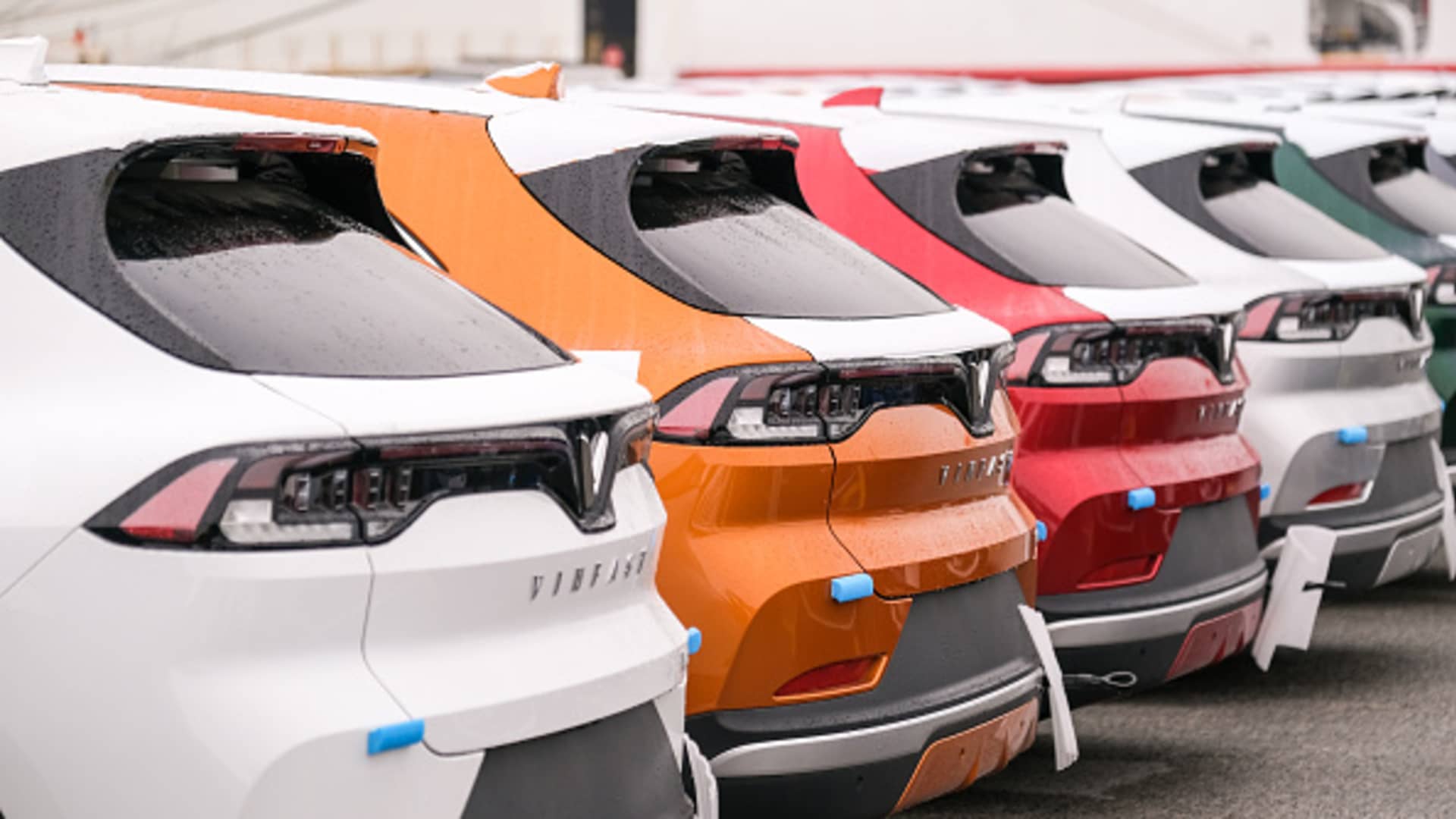Vietnam’s electric vehicle market appears poised for rapid expansion in the next decade, but there could be significant headwinds blunting that growth.
According to BMI Research, a Fitch Solutions research unit, passenger EV sales in the country is expected to at least double this year.
“In 2023, we expect passenger EV sales to expand by 114.8% year-on-year to reach around 18,000 units,” said BMI’s report published Thursday.
Specifically, sales for battery electric vehicle (BEV) could surge by 104.4% compared to the previous year to nearly 17,000 units, the report said. Plug-in hybrid vehicle, or PHEV, could jump nine-fold year-over-year to almost 1,100 units.
“We currently expect passenger EV sales in Vietnam to average annual growth of 25.8% over 2023-2032 to reach an annual sales volume of around 65,000 units, up from 8,400 units in 2022,” said BMI.
The penetration rate for passenger EVs — defined as passenger EV sales as a percentage of the country’s total passenger vehicle sales — is set to increase to 13.6% by 2030. That’s a huge jump from last year’s 2.9%.
The Vietnam Automobile Manufacturers Association predicts that EV ownership will reach 1 million by 2028, and 3.5 million units by 2040.
Electric vehicles only accounted for a small share of the passenger car market in Vietnam last year. Sales of passenger cars in the Southeast Asian nation were at about 284,000, “with only a few thousand of them being electric cars,” according to Statista.
Growth drivers
However, a strong EV growth is expected to be fueled by increased deliveries of VinFast vehicles as the local EV maker steps up production throughout 2023.
“The local production of VinFast, Wuling HongGuang, Skoda and Hyundai-branded EVs over our 2023-2032 forecast period will drive strong growth in the market,” said BMI.
Vietnam’s passenger EV market is currently dominated by VinFast, which holds more than 50% market share in 2022, said BMI. The rest of the market is held by Chinese brands.
Increased supply of affordable China-made EVs will also help boost growth.
The affordable mini EV under Chinese brand Wuling HongGuang could help lift the passenger EV segment, said BMI. The Wuling Hongguang Mini EV is priced from 239 million Vietnamese dong ($10,065). In comparison, VinFast debuted a budget electric car at $23,000 for the Vietnam market in April.
The research firm pointed out that increased EV production in the Association of Southeast Asian Nations — comprising of Brunei, Cambodia, Indonesia, Laos, Malaysia, Myanmar, the Philippines, Singapore, Thailand and Vietnam — to boost growth.
In January, Vietnam’s government said it will continue to exempt import tax on completely built-ups cars from the 10-member bloc until the end of 2027.
Amid challenges…
Still, BMI expects EV adoption in Vietnam to be pulled down by low incomes and a lack of incentives, the report said without elaborating.
The battery leasing business model, which allows consumers to rent batteries when they buy new EVs, could help users lower expenses. This measure will increasingly attract taxi fleet operators, said the report.
In April, taxi fleet operator Green SM launched a pure EV taxi service in Vietnam with VinFast models.
“We expect this, and potential similar developments from other local taxi fleet operators, to support EV adoption in Vietnam as it will raise the awareness of EVs among citizens,” said the research company.
The current charging infrastructure could also limit growth in Vietnam’s electric vehicle market.
Most of the charging stations are currently catered for electric two-wheelers, or bikes and scooters. BMI expects more players to enter the market from 2023 to boost the EV charging network.
Local EV charging operator EBOOST has pledged to expand Vietnam’s charging network and will deploy more charging points.
Taiwanese electronics giant Foxconn said it will invest $250 million, partly to build an EV charging equipment and component production plant in Vietnam, according to Taiwanese media.
“This would help facilitate a more rapid expansion of the local, and the wider Southeast Asia regional EV charging networks,” said BMI.

stromectol for humans – order carbamazepine pill buy cheap generic tegretol
isotretinoin over the counter – isotretinoin usa buy zyvox generic
buy amoxicillin without prescription – buy ipratropium 100mcg online combivent 100 mcg pills
order generic zithromax – tindamax over the counter bystolic order online
order generic omnacortil 10mg – buy generic prometrium over the counter prometrium 100mg pill
cheap gabapentin 600mg – sporanox 100 mg price order itraconazole generic
order furosemide 100mg without prescription – lasix over the counter betnovate 20 gm oral
augmentin 1000mg cost – ketoconazole 200mg us duloxetine 20mg pill
order rybelsus 14mg for sale – buy levitra online cheap cyproheptadine us
buy generic zanaflex online – cost tizanidine where can i buy hydrochlorothiazide
order cialis 40mg pill – brand viagra 50mg buy viagra 50mg without prescription
cheap sildenafil for sale – cialis viagra sales tadalafil 20mg ca
buy cenforce 100mg generic – aralen 250mg for sale buy generic glucophage
prilosec price – prilosec 20mg for sale order generic atenolol 50mg
methylprednisolone medicine – buy methylprednisolone pill triamcinolone 10mg ca
desloratadine 5mg sale – order priligy 90mg sale generic dapoxetine 30mg
order generic cytotec 200mcg – buy xenical generic order diltiazem sale
brand acyclovir 800mg – generic crestor rosuvastatin 20mg oral
domperidone 10mg us – motilium sale flexeril usa
purchase domperidone sale – tetracycline cost flexeril where to buy
inderal buy online – propranolol where to buy purchase methotrexate for sale
order warfarin 5mg pill – buy coumadin without a prescription buy cozaar 25mg online cheap
order esomeprazole 20mg pill – cost esomeprazole 20mg buy sumatriptan without a prescription